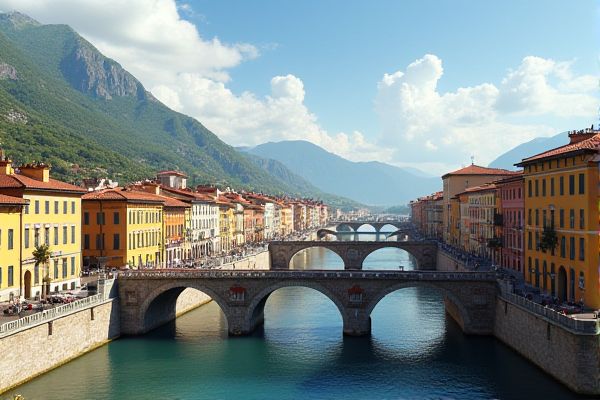
Cultural and recreational activities in Italy: Rich artistic heritage: museums, galleries, and historical sites. World-renowned cuisine: pasta, wine, gelato experiences. Vibrant festivals: Carnevale, Venice Film Festival, Palio di Siena. Historic architecture: Roman ruins, Renaissance buildings. Diverse landscapes: beaches, mountains, countryside adventures. Popular sports: soccer, cycling, skiing. Opera and music: La Scala, Puccini, Verdi compositions. Traditional crafts: ceramics, leather, glassmaking. Bustling markets: street vendors, local produce, antiques. Rich literary tradition: Dante, Machiavelli, Calvino works.
Rich artistic heritage: museums, galleries, and historical sites.
Italy is home to a rich artistic heritage, featuring must-visit destinations like the Vatican Museums, the Uffizi Gallery, the Galleria dell'Accademia di Firenze, and the National Archaeological Museum of Naples. Additionally, historical sites such as the Colosseum, Pompeii, and Herculaneum showcase an extensive collection of art, sculptures, and ancient artifacts. For more insights, explore the full list on the Expats Living In Rome website.
World-renowned cuisine: pasta, wine, gelato experiences.
In Italy, you can immerse yourself in world-renowned cuisine through hands-on pasta and gelato-making classes, such as those offered in Rome, where you learn to create fresh pasta, prepare seasonal sauces, and make traditional Italian gelato, all while enjoying unlimited wine and taking home a digital recipe booklet. Similar experiences are also available in Florence, where private cooking classes teach you to prepare pasta dishes and artisanal gelato, accompanied by fine wine and a digital cookbook to recreate the dishes at home. For more details, you can visit the Rome Pasta & Gelato Cooking Lesson page.
Vibrant festivals: Carnevale, Venice Film Festival, Palio di Siena.
Italy is renowned for its vibrant festivals, including the Carnevale, where Venice and Viareggio host elaborate celebrations with fancy costumes and floats; the Venice Film Festival, the world's oldest film festival showcasing international cinema; and the Palio di Siena, a traditional horse race in Siena's medieval square, highlighting community pride and centuries-old rivalries.
Historic architecture: Roman ruins, Renaissance buildings.
Italy is a country incredibly rich in historic architecture, offering glimpses into both its ancient and cultural grandeur. Among the most prominent era's showcases are the renowned Roman ruins and Renaissance buildings such as St. Peter's Basilica, the Basilica of Santa Maria Novella, and the Palazzo Pitti. These structures epitomize Italy's significant cultural and architectural heritage. The Italian culture is also marked by its architectural achievements, including ancient Roman wonders like those found in Pompeii, alongside Renaissance masterpieces crafted by visionary architects such as Brunelleschi and Palladio. Furthering this aesthetic journey are varied architectural styles like Romanesque, Renaissance, and Baroque, each influencing Italy's unparalleled historic landscape.
Diverse landscapes: beaches, mountains, countryside adventures.
Italy offers a diverse range of cultural and recreational activities across its varied landscapes, including the rugged mountains of Stelvio National Park and the Dolomites, the picturesque beaches and villages of Cinque Terre, and the countryside adventures in Tuscany and the Abruzzo Park, each providing unique experiences for outdoor enthusiasts and nature lovers. The country's national parks, such as Gargano and Val Grande, also offer opportunities for hiking, biking, and exploring dense forests and coastal beauty. Discover more about these breathtaking destinations by visiting Italy's Natural Wonders to plan an unforgettable journey through enchanting terrains.
Popular sports: soccer, cycling, skiing.
In Italy, the most popular sports include Soccer, the most beloved and closely tied to national identity, Cycling with prestigious events like the Giro d'Italia, and Skiing, particularly in the Dolomites, which is a renowned winter sports destination with extensive ski resorts and facilities.
Opera and music: La Scala, Puccini, Verdi compositions.
Italy's rich opera and music culture is epitomized by the Teatro Alla Scala in Milan, a renowned neoclassical opera house where iconic compositions by Giuseppe Verdi and Giacomo Puccini, such as Verdi's Aida and Rigoletto, and Puccini's Madama Butterfly and La Boheme, have been premiered and continue to be performed. This illustrious venue highlights the country's significant contribution to the world of opera and classical music, and more information can be found on the Teatro Alla Scala website.
Traditional crafts: ceramics, leather, glassmaking.
Italy is renowned for its traditional crafts, including ceramics in places like Faenza, Albissola, and Deruta, known for their colorful and creative variations; leather craftsmanship, particularly in regions like Molise; and glassmaking, notably in Murano, Venice, where ancient techniques are still practiced and taught in workshops and courses. For those interested in exploring these rich artisan traditions, the Visit Italy website offers guides and tours to discover where to find these local handcrafts throughout the country.
Bustling markets: street vendors, local produce, antiques.
Italy's markets are a vibrant part of its culture, offering a wide range of experiences from daily outdoor markets selling fresh, seasonal produce, meats, and local specialties, to weekend and monthly markets featuring high-quality regional items, antiques, and handmade artisanal goods. These markets, such as Mercato di Testaccio in Rome and Mercato Pignasecca in Naples, provide a glimpse into authentic [Italian Outdoor Market Culture](https://gratsi.com/blogs/all/the-italian-outdoor-market-culture), community, and traditions.
Rich literary tradition: Dante, Machiavelli, Calvino works.
Italy's rich literary tradition is highlighted by works from renowned authors such as Dante Alighieri, known for his epic poem "Divine Comedy," Niccolo Machiavelli, author of "The Prince," and later figures like Italo Calvino, who contributed significantly to modern Italian literature with works like "Invisible Cities" and "If on a winter's night a traveler." For more on these iconic authors and their contributions, you can explore the detailed explanations on Italian Literature.
